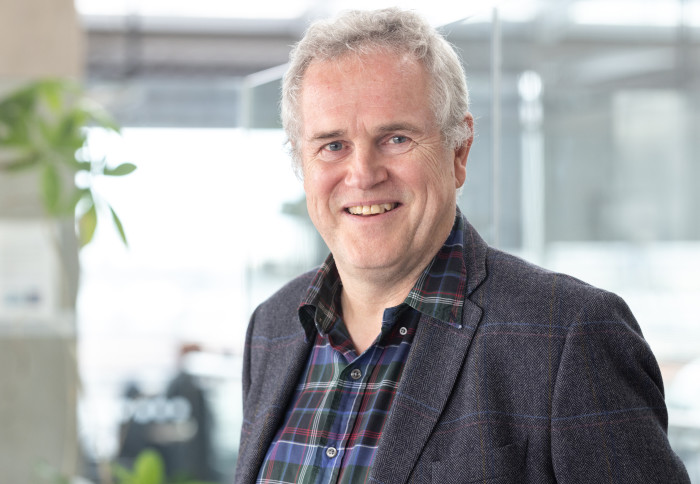Imperial expert to lead decarbonisation of power grid with £4m Leverhulme grant

Professor Mark O'Malley
Professor Mark O’Malley has joined Imperial College London as the Leverhulme International Professor of Power Systems.
Professor O’Malley joins the Department of Electrical and Electronic Engineering to lead a research team of 13 working to decarbonise the electricity grid, supported by £4million in funding from The Leverhulme Trust.
Climate change is the biggest challenge of our generation. A powerful way to tackle this will be transitioning to a fully decarbonised electricity grid Professor Mark O'Malley Department of Electrical and Electronic Engineering
The grant will focus on developing technologies to run the power grid – the network that delivers electricity from producers to consumers, also known as the electricity grid – using 100 per cent renewable energy like wind and solar.
Professor O’Malley said: “Climate change is the biggest challenge of our generation. A powerful way to tackle this will be transitioning to a fully decarbonised electricity grid, and one way of doing this is by going towards 100 % renewable electricity.
“No one organisation, no matter how large or well-resourced, can solve this challenge alone. Therefore, a global collaborative approach is required, working across the research, industry, and end-use communities to solve the challenges at the pace and scale that is needed.”
The research will be done in collaboration with the Global Power System Transformation Consortium (G-PST), which Professor O’Malley co-founded prior to joining Imperial when he was at the National Renewable Energy Laboratory in the USA as Chief Scientist of Energy System Integration.
Mr Fintan Slye, the Director of National Grid Electricity System Operator and Chair of the CEO group of the G-PST, said: “This project will contribute substantially to the goals of the G-PST and will further enhance the UK’s strong reputation in transitioning to Net Zero, which is of vital national and international importance. It provides an enormous opportunity for the UK, Imperial, and the research team to make a real lasting global impact on climate change.”
Recognised as a world authority on integrating the electricity grid with renewable energy sources as part of the transition to a Net Zero economy - a key strategic priority for the College. Professor O’Malley said: “My new professorship will enable us to set a bold new direction for pursuing zero-carbon energy systems.”
The addition of Professor O’Malley and Dr Spyrou to Imperial’s academic staff is a welcome boost to our already strong reputation in decarbonisation of electricity grids, and to Imperial’s Transition to Zero Pollution initiative. Professor Eric Yeatman Department of Electrical and Electronic Engineering
Also joining Imperial as part of Professor O’Malley’s team is Dr Elina Spyrou, who has developed and applied engineering-economic models to identify cost-effective, reliable, and equitable solutions for future power systems in the developing and developed world.
Dr Spyrou said: “I am thrilled to join the team at this point of the energy transition, when our research community can help accelerate the decarbonisation of electricity systems and lay the groundwork to combat climate change.”
Professor Eric Yeatman, Head of the Department of Electrical and Electronic Engineering, said: “The addition of Professor O’Malley and Dr Spyrou to Imperial’s academic staff is a welcome boost to our already strong reputation in decarbonisation of electricity grids, and to Imperial’s Transition to Zero Pollution initiative.”
Decarbonising the grid
Energy from fossil fuels is a major driver of the greenhouse gas emissions that are warming our climate. Transitioning from a fossil fuel reliant society to one that embraces renewable sources like wind and solar power will play a major part in limiting the climate crisis.
While grid-integrated renewables are not the only solution to climate change, they are a major part of decarbonising the energy system. The challenge lies in integrating energy from renewable sources into the grid with a view to enabling the grid to operate with 100 per cent renewable-powered generation.
However, increasing the input from renewable energy resources brings challenges: for example, wind and solar generation, unlike fossil fuelled generation, connects to the grid with inverter-based resources which will alter the fundamental characteristics of the electricity grid, requiring new operational and planning techniques and technologies.

The research
I am thrilled to join the team at this point of the energy transition Dr Elina Spyrou Department of Electrical and Electronic Engineering
Professor O’Malley’s team is working to develop technologies that enables a decarbonised grid to reliably maintain supply-demand balance, at all points in time, at all locations, equitably, at the least cost, with minimum impact on the environment.
The Leverhulme International Professorships grant aims to help universities attract a globally leading scholar to take up a permanent professorial post in the UK.
Niall FitzGerald, Chairman of the Leverhulme Trust Board, said: “Through the Leverhulme International Professorship scheme, the Trust aims to maintain the UK’s international standing as a world-renowned research destination; open to outstanding talent and ideas from around the globe.”
Recruitment
Professor O’Malley and Dr Spyrou are now recruiting the research team.
The roles available are:
- Research Associate (X4)
- Research Assistant (X2)
- PhD Studentships (X4)
Photos: Thomas Angus, Imperial College London
Article supporters
Article text (excluding photos or graphics) © Imperial College London.
Photos and graphics subject to third party copyright used with permission or © Imperial College London.
Reporter
Caroline Brogan
Communications Division
Thomas Angus [Photographer]
Communications Division